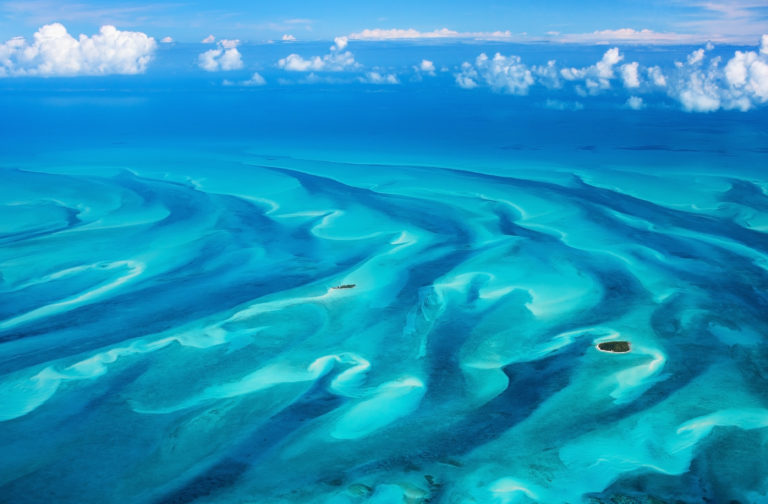After Drilling Bust Off The Bahamas, Groups Call for Permanent Ban
By: Waterkeeper Alliance

Despite BPC Oil Drilling Failure, Danger from Offshore Drilling Persists
The Bahamas Have Dodged a Bullet, Environmental Leaders Say
After facing months of opposition from local, national, and international environmental groups, Bahamas Petroleum Company (BPC) this week abandoned and sealed their exploratory well in Bahamian waters — about 150 miles away from the Florida coastline where a ban on offshore oil drilling exists. Following this failed attempt, BPC has indicated a desire to continue exploratory drilling in Bahamian waters. Groups are now calling on the Bahamian government to permanently ban offshore drilling.
In December 2020, BPC began drilling an exploratory well off the coast of the Bahamas in search of oil only to determine that the oil quantities were not commercially viable.
“The only way we can completely protect the Bahamian coastline, water resources, and wildlife is a full moratorium on oil exploration and extraction,” said Rashema Ingraham, executive director of Waterkeepers Bahamas, a member of the Our Islands, Our Future coalition. “The health of our water resources and environment is always paramount, and as citizens of the Bahamas, it’s also not lost on us that our economy is almost entirely dependent on our drinkable, swimmable, and fishable waterways. Exploratory drilling puts 400,000 Bahamian lives and livelihoods at risk.”
Tourism in the Bahamas accounts for an estimated 51 percent of the country’s gross domestic product (GDP), and the industry is responsible for nearly half of the islands’ jobs. Some of its most sought after tourism products are world-class spiny lobster fisheries certified by the Marine Stewardship Council and legendary bonefishing flats that draw visitors from around the world in the direct vicinity of the exploratory well location. Environmental and business advocates based in Florida echoed similar concerns about the integrity of their shorelines and water resources, which make up the economic backbone of the state’s tourism industry.
“We need a full moratorium on oil exploration and extraction in Bahamian waters,” said Casuarina McKinney-Lambert, executive director of BREEF, a member of the Our Islands, Our Future coalition. “The drilling that took place off the west coast of Andros Island for the past 48 days caused considerable damage to the seafloor and was a clear threat to our waters and our economy and that of our neighbors. It was a risk to the well-being of our ecosystems and our people who depend on healthy oceans for tourism and fisheries, and ultimately our way of life. This will send the message to the world that we take the protection of our environment seriously, that we care about our people, and that we are serious about building a climate-resilient future.”
“While we still have not seen the Bahamas Petroleum Company’s report on plugging and abandoning the exploratory well, it appears the Bahamas has dodged a bullet,” said Marc Yaggi, executive director of Waterkeeper Alliance, a member of the Our Islands, Our Future coalition. “We must stop exploring for more oil immediately, as it’s entirely inconsistent with protecting coastal communities and water quality and keeping the worst effects of climate change at bay.”
“Offshore drilling in the Bahamas is dangerous for both the country’s tourism-driven economy and its pristine waters. We hope the Bahamian government takes this as a sign to stop this senseless journey, permanently,” said Diane Hoskins, campaign director, Oceana. “The United States and the Bahamas have a shared interest in preventing the associated devastation to our climate, coastal communities, and economy.”
The BPC oil well subjected the islands and nearby waters to many tons of toxic discharges, and the additional risk of an oil disaster. Advocates argue that exploratory drilling off the coast of the island nation is not sustainable, particularly in a country so reliant on a healthy ocean environment and one that finds itself on the front lines of climate change.
If the company successfully entered into full production, the emissions resulting from oil at this location would have exceeded the carbon footprint of the Bahamas and 17 other Caribbean nations over 20 years.
Our Islands, Our Future coalition has called on the Bahamian government to provide better transparency in its dealings with oil companies and investors by fully implementing the Freedom of Information Act, a promise that has yet to be fulfilled.
Bahamas Petroleum Company has stated that they will review the drilling data and present the information to the Government of The Bahamas in line with the requirements of their license. Their statement adds further that they hope to monetize the other licenses they hold in the Bahamas.